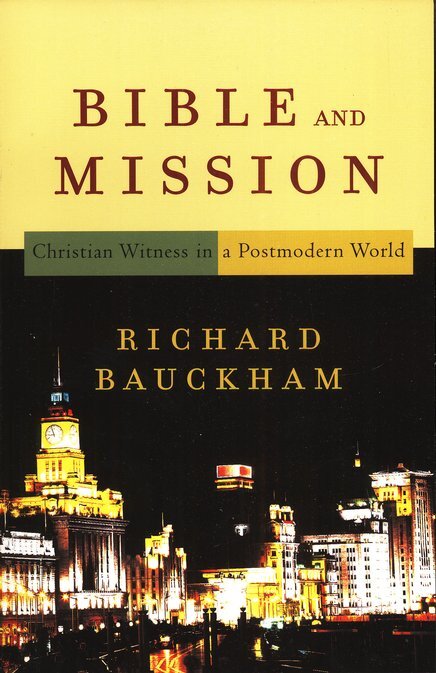Richard Bauckham, Bible and Mission: Christian Witness in a Postmodern World. Baker Academic, 2003.
- Theology of Mission, Proposals and Formulations – Missio Dei
- Theology of Mission, Localized Theologies/Contextualization
LifeandLeadership.com Summary
This is a brief but densely packed volume that offers a way of interpreting Scripture through the rubric of a missional metanarrative. It commonly appears in the recommended bibliographies of the missional movement.
Bauckham’s chief contribution is his defense of the Biblical story as a metannarattive over against the posture of hard postmodernism that disparages metanarratives and “opts for particularity, diversity, localism, relativism.” (7) Bauckham replies that “God is both universal and particular.” (9) He is both the universal God of heaven and earth and the one chooses to reveal himself through particulars. He reveals himself from Abraham to all the families of the earth, from Israel to all the nations, to all humanity by way of the least, by today’s Christian communities to the world, etc. This is mission. He proposes this mission a way of reading the Bible as whole to uncover its
“single story, an overall narrative encompassing… many other stories and including many forms of non-narrative literature within it, but constituting in its overall direction a metanarrative, a narrative about the whole of reality that elucidates the meaning of the whole of reality.” (12)
These are Bauckham’s uniquely expressed contributions that are sufficient to recommend it as an important read relative to theology of mission.
One caveat. Bauckham is biased that the dominate metanarrative over which Scripture should be set against today is “global capitalism.” This is defined as “a western-dominated process in which a purportedly universal ideology – unfettered free market capitalism as a self-evident good – serves the economic interests of those with economic power.” (6) Bauckham spends considerable time in the last chapter setting scripture over against a critical view of “the global spread of free-market economics and the culture it entails, consumerist individualism, all dominated by the multinational corporations with their bases in the United States and other western countries.” (94) He argues, “Christians should not be seduced by the enticing notion that economic growth as such is self-evidently a prime good for humanity.” (95) Christians should also work to detach themselves from their “own undoubted collusions with the oppressive metanarratives of western imperialism and progress.” (97) This is certainly true to an extent, but I would suggest balancing it with well-presented arguments that are less biased against capitalism.
From the Publisher
This engaging study provides a new way of looking at Scripture—one that takes seriously the biblical idea of mission. Richard Bauckham shows how God identifies himself with particular individuals or people in human history in order to be known by all. He is the God of Abraham, Israel, and David and, finally, the one who acts through Jesus Christ. Bauckham applies these insights to the contemporary scene, encouraging those involved in mission to be sensitive to postmodern concerns about globalization while at the same time emphasizing the uniqueness of Christian faith. In doing so, he demonstrates the diversity of Christian faith around the world. This book will be rewarding reading for pastors, lay readers, and students of Scripture, mission, and postmodernism.
About the Author
Richard Bauckham, (Ph.D., University of Cambridge) is professor of New Testament studies and Bishop Wardlaw Professor at the University of St. Andrews, Scotland. He is the author of numerous volumes, including The Theology of the Book of Revelation, God Crucified, and God and the Crisis of Freedom.
***For additional information on this resource, including reviews, click the bookstore links. Check the reference at page top or the links below for resource guides on related topics.***
Related Ministry Resource Guides:
- Missional Perspectives 01, Introduction
- Missional Church Resources, Introduction and Index
- Missional Philosophy
- Theology of Mission
- Missional Communities
- Missional Leadership / Missional Strategies
- Missional Lifestyle, Discipleship, Spirituality
- Church Leadership and Renewal, Index to Resources
- Ecclesiology
- Evangelism
See Resources on Over 100 Areas of Ministry Leadership:


